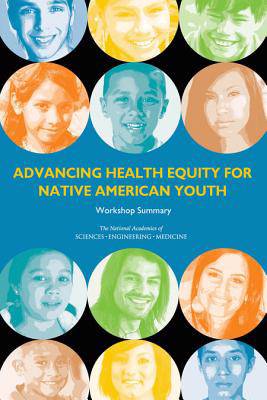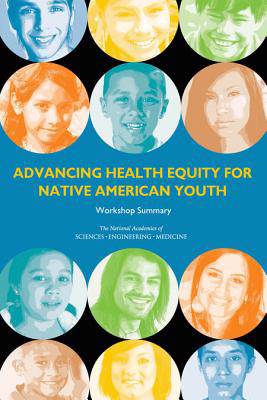
- Retrait gratuit dans votre magasin Club
- 7.000.000 titres dans notre catalogue
- Payer en toute sécurité
- Toujours un magasin près de chez vous
- Retrait gratuit dans votre magasin Club
- 7.000.0000 titres dans notre catalogue
- Payer en toute sécurité
- Toujours un magasin près de chez vous
Advancing Health Equity for Native American Youth
Workshop Summary
National Academies of Sciences Engineering and Medicine, Health and Medicine Division, Board on Population Health and Public Health Practice, Roundtable on the Promotion of Health Equity and the EliminationDescription
More than 2 million Americans below age 24 self-identify as being of American Indian or Alaska Native descent. Many of the serious behavioral, emotional, and physical health concerns facing young people today are especially prevalent with Native youth (e.g., depression, violence, and substance abuse). Adolescent Native Americans have death rates two to five times the rate of whites in the same age group because of higher levels of suicide and a variety of risky behaviors (e.g., drug and alcohol use, inconsistent school attendance). Violence, including intentional injuries, homicide, and suicide, accounts for three-quarters of deaths for Native American youth ages 12 to 20. Suicide is the second leading cause of death--and 2.5 times the national rate--for Native youth ages 15 to 24.
Arrayed against these health problems are vital cultural strengths on which Native Americans can draw. At a workshop held in 2012, by the National Academies of Sciences, Engineering, and Medicine, presenters described many of these strengths, including community traditions and beliefs, social support networks, close-knit families, and individual resilience. In May 2014, the Academies held a follow-up workshop titled Advancing Health Equity for Native American Youth. Participants discussed issues related to (1) the visibility of racial and ethnic disparities in health and health care as a national problem, (2) the development of programs and strategies by and for Native and Indigenous communities to reduce disparities and build resilience, and (3) the emergence of supporting Native expertise and leadership. This report summarizes the presentations and discussions from the workshop.
Spécifications
Parties prenantes
- Auteur(s) :
- Editeur:
Contenu
- Nombre de pages :
- 74
- Langue:
- Anglais
Caractéristiques
- EAN:
- 9780309376136
- Date de parution :
- 22-07-16
- Format:
- Livre broché
- Format numérique:
- Trade paperback (VS)
- Dimensions :
- 175 mm x 251 mm
- Poids :
- 272 g

Les avis
Nous publions uniquement les avis qui respectent les conditions requises. Consultez nos conditions pour les avis.






